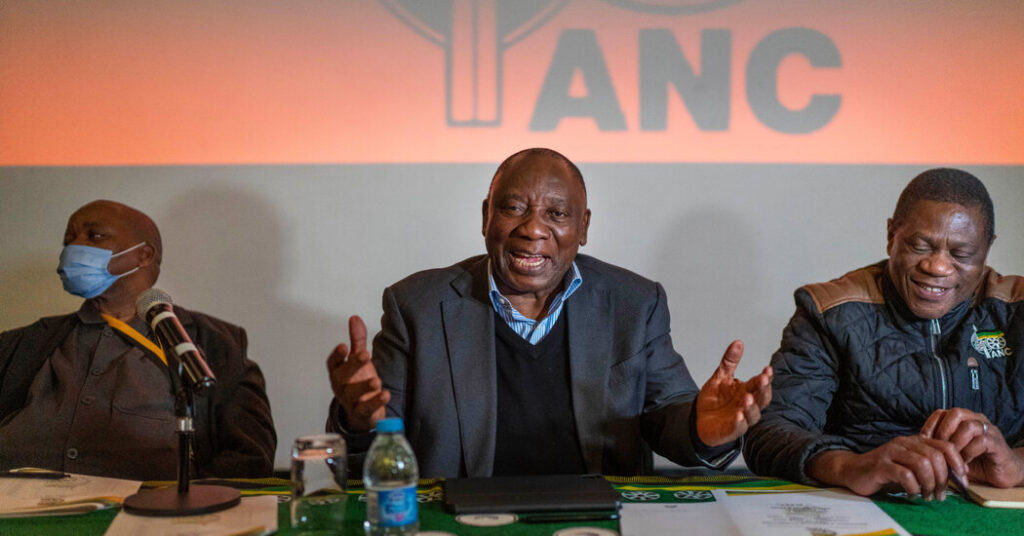Entering a new era of political unpredictability, South Africa’s newly elected parliament convened for the first time on Friday as lawmakers prepared to elect the country’s next president after last month’s national election.
The long-ruling African National Congress, which failed to secure an outright majority for the first time since taking power after the end of apartheid, is expected to forge a delicate alliance with rival parties to clear the way for Cyril Ramaphosa’s election to a second term as president.
But two weeks after the election, talks between Ramaphosa’s African National Congress and rival parties have descended into chaos.
The process has exposed deep fissures within the ANC and wider society, and in a striking development, parliament opened without any formal announcement of a coalition agreement.
The president’s party has governed with a majority since apartheid ended in 1994. dissatisfied.
After losing its dominant position in parliament, the ANC reached out to a broad range of parties that won seats in the National Assembly, seeking to establish a so-called national unity government that would give all parties a role in governing.
The ANC is seeking to allay concerns among South Africans that the lack of a single dominant party at the national level for the first time in the democratic era will lead to political chaos that has plagued cities under shared leadership.
“The fundamental question is how do we move South Africa forward,” Fikile Mbalula, one of the ANC’s top officials, said on the eve of the first session of the newly elected parliament. “The majority of our country’s political parties believe that this moment requires working together.”
But even before 400 members of parliament convened on Friday at a conference center on Cape Town’s Atlantic coast, sharp divisions were emerging in the new political landscape.
The surprise party in the election, the “UMKhonto weSizwe” party led by former president and ANC leader Jacob Zuma, boycotted the opening of parliament after winning 58 seats (the third highest among all parties).
The party, known as MK, performed better than any first-year party in the democratic era. But Mr Zuma claimed without providing evidence that the election was rigged and that his party won far more than the nearly 15% the electoral commission claimed.
MK has called for Ramaphosa to resign if the ANC wants him to join the governing coalition. ANC officials said the request was impossible to achieve.
The fourth-largest party, the Economic Freedom Fighters, a breakaway group from the African National Congress, also appeared to have rejected calls to form a coalition government.
Party leader Julius Malema, a former ANC youth firebrand before being expelled in 2012, has said he would refuse to join the Democratic Alliance, which includes the second largest party alliance. The Democratic Alliance’s leadership is largely white and proposes an end to affirmative action laws and other policies that incentivize black corporate ownership.
“We reject this government,” said Mr Malema, who believes the DA promotes racist policies and “white supremacy”.
Mr Malema’s party did not join the ANC’s unity efforts but teamed up with five others to form what they called the Progressive Caucus.
Resistance to the Democratic Alliance, which won nearly 22% of the vote, also came from within the ANC. Some members and partners in labor and business openly resisted, arguing that the Democratic Alliance would seek to hinder or even weaken efforts to eliminate the racial inequalities of apartheid.
The pushback has forced ANC leaders to walk a delicate line as they try to avoid alienating the party’s black voter base while also promoting the idea that working with the DA is a smart move for the country.
The Democratic Alliance embraces free-market capitalism, an approach that some ANC leaders believe will help the economy and attract investors. This contrasted with some of the more radical wealth redistribution policies promoted by MK and the Economic Freedom Fighters, such as bank nationalization and the seizure of land from white owners without compensation.
The DA is one of the parties most eager to join a unity coalition, despite last year vowing never to partner with the ANC in government. Its leader has said it is important to prevent what was called a “doomsday alliance” between the ANC and the Economic Freedom Fighters during the campaign.
“We engaged in a positive and constructive way, and so did they,” said Tony Leon, a member of the Democratic Alliance negotiating team.
To soften the backlash, ANC leaders formed a partnership with the Democratic Alliance and the Inkatha Freedom Party, a black-led party popular among speakers of Zulu, a South African family language The most widely spoken language in .

